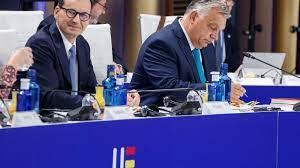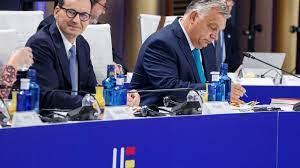
Poland And Hungary Clash With EU Over Migration Reform

GRANADA (Spain), Oct 7 (NNN-AGENCIES) - A furious row over planned changes to Europe's migration rules overshadowed an EU summit Friday, although supporters of the reform vowed opposition from Poland and Hungary would not derail it.
The Polish and Hungarian leaders did prevent the leaders from including migration in a joint statement of the summit's conclusions, forcing the meeting to end on a sour note of division.
But European Council president Charles Michel issued a separate statement about asylum policy and border protection in his own name, and the French and German leaders said the legislative process would continue as planned.
“The most important thing is what our interior ministers achieved a few weeks ago with the agreement on crisis regulation, because that is what is really relevant in political terms,” said Spain's Prime Minister Pedro Sanchez,
who hosted the summit, dismissing concerns about the clash.
But the gathering in the southern city of Granada did hand Polish Prime Minister Mateusz Morawiecki - who is facing a general election this weekend - and Hungary's Viktor Orban a stage on which to brandish their populist credentials for their domestic audiences.
“I officially REJECT the entire paragraph of the summit conclusions regarding migration,” Morawiecki posted on social media as the summit came to an end.
Earlier, Orban courted outrage by comparing the EU's“forcing through” of migration legislation - which was approved by a majority of member states - to Hungary being“legally raped”.
France's President Emmanuel Macron said that although their opposition had blocked any mention of migration in the final declaration, it would have no effect on the proposed bill, which was approved in outline by member states on
Wednesday.
“The text has caused disagreements between several member states,” Macron said, dismissing it as “a secondary issue because the matter is moving forward as it should after being passed by majority”.
Member states, he added, had agreed to strengthen“joint action regarding transit countries and countries of origin”.
Migration surged to the top of Brussels' agenda after thousands of asylum seekers landed on the Italian island of Lampedusa, highlighting the urgency of consolidating a unified European response.
On Thursday, leaders from across the continent had met under the auspices of the European Political Community (EPC), a forum to develop a joint geopolitical strategy.
But Spain, which hosted both meetings, failed to put the crisis on the agenda of that summit, frustrating several members, notably Italy and Britain who convened a side meeting on the issue.
During those sideline talks, Italian Prime Minister Georgia Meloni and Britain's Rishi Sunak, backed by France and the Netherlands, pushed for more work with third countries to prevent boats carrying asylum seekers from even setting off for Europe.
In an op-ed published on Friday in Britain's Times newspaper and Italy's Corrierre della Sera, the pair said European nations were“recognising that the current approach is not working”.
Insisting their aggressive approach was“already delivering results,” they urged other leaders to“act with the same sense of urgency” against people-smuggling gangs to break the back of irregular immigration across Europe.
Wednesday's vote saw member states approving the final part of an overhaul of the rules on handling asylum seekers and irregular migrants, setting up a push for the European Parliament to make it law before elections next year.
The new Pact on Migration and Asylum will seek to relieve pressure on so-called frontline countries like Italy and Greece by relocating some arrivals to other EU states.
Those opposed to hosting asylum seekers would be required to pay those that do.
Meloni, who had clashed with Germany's Chancellor Olaf Scholz in the run up to the summit, said she was now“satisfied” with the direction Europe was heading, seeing it as“more pragmatic” in its approach to halting human
trafficking and illegal immigration.
EU figures published on Friday showed there was a 29-percent rise in irregular migrant returns in the second quarter of 2023 compared to the same period a year earlier.
A total of 26,600 people were sent back, while the number ordered to leave rose by 9.0 percent to 105,865.
By August 31, EU nations were hosting almost 4.2 million Ukrainian refugees from Russia's war, half of whom were in Germany and Poland. - NNN-AGENCIES

Legal Disclaimer:
MENAFN provides the
information “as is” without warranty of any kind. We do not accept
any responsibility or liability for the accuracy, content, images,
videos, licenses, completeness, legality, or reliability of the information
contained in this article. If you have any complaints or copyright
issues related to this article, kindly contact the provider above.


















Comments
No comment